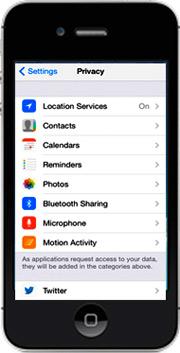 Apple's upcoming operating system could prevent analytics companies from tracking iPhone and iPad users in brick-and-mortar stores, according to a privacy presentation given at the Worldwide Developers Conference.
Apple's upcoming operating system could prevent analytics companies from tracking iPhone and iPad users in brick-and-mortar stores, according to a privacy presentation given at the Worldwide Developers Conference.
The
company said in the presentation that iOS 8's WiFi scanning will use “random, locally administered MAC addresses,” instead of the permanent MAC addresses. The move is significant because
the retail analytics companies that track shoppers in stores do so via their devices' 12-digit “media access control” (MAC) addresses -- identifiers that are broadcast when users turn on
WiFi or Bluetooth.
Apple didn't respond to a request for comment for this article.
advertisement
advertisement
Observers say the change could put a big crimp in companies' ability to track brick-and-mortar
shoppers who use iPhones and iPad devices. “It's likely to siginificantly affect companies that are tracking Mac users,” says Jules Polonetsky, executive director of the industry-funded
think tank Future of Privacy Forum.
The move comes as Apple is rolling out its own iBeacon technology -- a Bluetooth low-energy based system that enables smartphone users to interact with
sensors in stores.
Apple's news comes several months after the Future of Privacy Forum moved forward with a privacy initiative aimed at enabling consumers to opt out of location tracking. The
group launched a Web site, www.smartstoreprivacy.org, where consumers can reject location-tracking by entering their devices MAC addresses.
Eleven mobile analytics companies had agreed to honor those opt-outs as part of a new industry code of conduct. The analytics companies typically provide location data to retailers and mall owners,
who often use the information to assess traffic patterns. For instance, location data can show whether a mall's anchor store is driving traffic to other, smaller shops.
The data is only
presented to retailers in aggregated form, but the technology is controversial, with some observers saying that consumers don't expect that their phones will be used to track them. Sen. Al Franken
(D-Minn.), who often expresses concern about potential privacy violations, has said that location tracking should require users' opt-in consent.
Justin Brookman, head of consumer privacy for
the digital rights group Center for Democracy and Technology, praised Apple's decision. “Obviously, there's been a lot of concern about using WiFi probing signals to track phones in unexpected
ways, so it's gratifying to see them respond to the concerns of their customers,” he says.